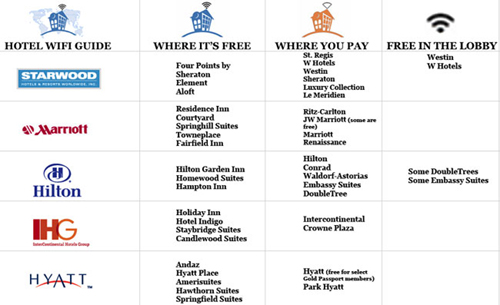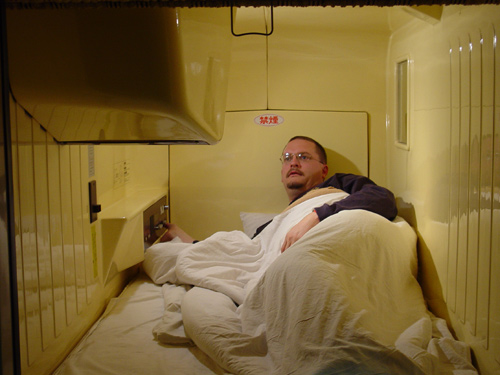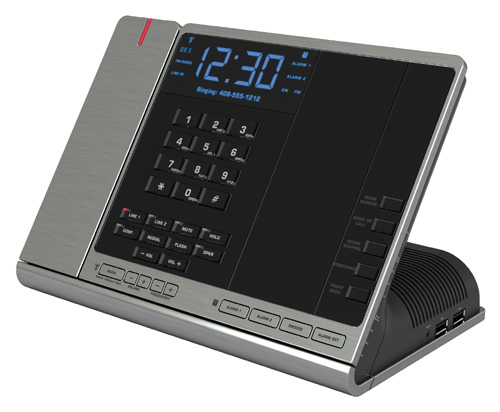You have their full attention – but that’s a good thing. (Source: markjhandel)
1) Free in room Wi-Fi
I’m still amazed at the mid- and upper-level hotels that continue to not offer or, even worse, charge their guests for Wi-Fi. In the very least, hotels should offer free Wi-Fi in a quiet area where guests can go to conduct business, away from the bar. Hotelchatter.com does a thorough study each year and compiles a quick reference chart. If your laptop is useless to you without Wi-Fi, you can check-out these alternative uses just in time for winter.

Before you book, check the chart (Source: Hotel Chatter)
2) Online travel agencies
Voyages-sncf.com, Expedia, Inc., Sabre Holdings, Opodo, and Priceline.com have become the elephants in the hotel room booking business. Each with 2008 annual revenue in the billions plus ($USD), they continue to be a saving grace for travelers and a source of frustration for royalty-paying hotels. Only a few niche personal travel agents will survive this paradigm shift of information efficiency. To compete, fare aggregators and metasearch engines like Kayak.com, Cheapflights.com, and SideStep.com continue to stockpile their information offers.
3) Informed Vagabonding
Vagabonding is travelling on the cheap. Those that piggyback for airline points but can’t find a nearby Couchsurfing.com buddy give hotels unique bargaining challenges. Numerous last-minute hotel deals have been found by using sites like Vagabondtraveller.com. Being able to provide non-touristy information to these seasoned (and occasionally smelly Ü) travelers is a challenge front desk or concierge employees must successfully overcome.
4) The Twitter Deal
Aside from the plethora of non-informative or news-repeating tweets available, hotels have made some Twitter progress. The last minute Twitter coupon code has already made it the go-to site for smart travelers. Whether it builds customer loyalty is a matter of execution. Hotels that creatively fulfill their target guests’ needs continue to do well. Have a favorite stay? Always check their twitter feed before booking.
5) TripAdvisor
The one stop shop for hotel and bed & breakfast reviews, Tripadvisor.com now has over 25 million reviews to read and for the most part, trust. It allows travelers to find out if construction on an addition is currently waking guests up at 8 am or if the service staff is exquisitely well trained and motivated.
6) Hotel Alternatives
The 2008/2009 economic downturn was a booming opportunity for those associated with what are typically more frugal accommodation alternatives. I don’t have to look across the street at HomeAway.com’s new office here in downtown Austin to understand the benefits of structured information for deal-seeking travelers and scheduled booking for their home-owning clients. The acquisition of VRBO.com secured their spot in the United States at the top of the vacation home food chain. BedandBreakfast.com operates in a similar space for bed and breakfasts while offering a gift card service for travelers to book nights with their clients.
7) Airport, Capsule, or Mini-Hotels
The nap & shower model tries to grab travelers with long layovers or heavy hangovers. Honolulu International Airport tried it but eventually failed, yet the nearby Nimitz Shower Tree Mini-Hotel is picking-up where they left off. The model is not very popular in the States, but Europe and Japan boast a healthy demand for weary travelers looking for a convenient reprieve. A popular capsule hotel near Kabukicho in Tokyo is mostly for recovering businessmen after an evening of drunken debauchery.

Capsule hotel in Japan. One at a time please. (Source: Yesicanusechopsticks)
8) Boutique hotels in the U.S.
According to The Independent, the term “boutique hotel” was coined by entrepreneur Steve Rubell when he and Ian Schrager opened Morgans on Madison Avenue in 1984, because, for comparison, it was more like a boutique rather than a department store. The popularity of this experience blossomed with the real estate boom and bust of the past few years. Whether companies trying to differentiate their properties from the norm will continue on this path coming out of this downturn remains to be answered.
9) Green Hotels
The green hotel movement gained momentum this last decade. A percentage of travelers demand they stay in not only a LEED certified structure, but with environmentally conscious services. The hotel’s LEED plaque will state whether the hotel has silver, gold, or platinum status. Sheraton’s Element Hotels is the first hotel chain that requires all properties be LEED certified. At the far end of the spectrum, Maho Bay Camps in the Virgin Islands range from “eco-tents” to rain-collecting cottages.
10) Frequent Visitor Preferences
The last decade have seen guest services launch into a completely new dimension. The Seinfeld episode where George injures his hamstring trying to kick out his tucked-in bedsheets has some truth to it, as the maid actually left the correct bed untucked (George and Jerry were in different beds when the request was made). Some hotel chains now keep track of your favorite soap and shampoo, what radio station to have your alarm dialed to, and yes, whether or not to leave your sheets untucked. Guests have become less paranoid about allowing their hotel to keep this information and the smart managers have taken advantage.
11) The iHome
Speaking of alarm clocks, the growth mp3 popularity from Napster to today’s legal paid services forced many hotels to recognize the antiquated nature of the $10 alarm clock. Enter the iHome. There are many variations, but the iHome became the defacto standard for playing mp3s in your room. And in the future? Bittel Electronics just created an alarm clock/phone/radio/iPod/iPhone/mp3 player interface called the UNO. Nice.

phone + clock/radio + iPod dock = UNO (Source: Bittelcom)
12) HTNG: Hotel Technology Next Generation
Founded in 2002, the association exists to guide the behind-the-scenes technology into some form of sanity. Hotel managers have notoriously fought with multiple booking, room-scheduling, point-of-sale, rate-spreading, appointment-scheduling in the past. HTNG has guided vendors to unify their offerings to work together to meet the accommodation industry’s needs. They’re a “global trade association that fosters, through collaboration and partnership among hoteliers and technology providers, the development of next-generation solutions that will enable them to do business globally in the 21st century.”
These requests have help push toward advanced Property Management Systems (yes, PMS) that can be smarter in ways managers have been table-pounding their fists for years ago. Systems now exist that can handle point-of-sale transactions for multiple locations and still remotely turn-off HVAC systems in an unoccupied room.
13) Hotel and Travel Blogs
I’m sure some people still grab travel guide books like Fodor’s, Lonely Planet, or Frommer’s, but much like the newspaper industry, travel information has migrated online. The people that still do pick-up these books are half “I don’t want to stare at a computer” and half “I want people to see that I’m planning a trip.” Travel is massively broad topic to blog about and as a result, there exists a copious amount of sub-topic travel blogs. Most bloggers get paid by their advertisers, by the hotel or airline industry, or indirectly by both. At Überoom, we’re no different.
A blog review MIGHT not make or break a hotel or bed & breakfast, but high-traffic blogs like Gadling.com, Deliciousbaby.com, and Jaunted.com sure do command respect.
14) Kiosks: Check-in/Check-out/Concierge
As I wrote in Improved Customer Service: Top 3 Reasons Why, the number of employees in the broader accommodation industry has declined for over a year now. However, the decline in guests has outpaced the lay-offs.
During this downturn, hotels are quickly learning the benefits of automation and affiliation. The very same kiosk technology that helps you check-out at the grocery store or print-out your boarding pass at the airport also arrived in your hotel lobby. Not only are kiosks complimenting front desk employees, but your friendly concierge now has a department trainee as well.
All this automation is great, but in order to improve the quality of their services, hotels are increasingly affiliating with companies to provide everything from airport shuttles to special packages, but that detail is best left for another post!
What will the next decade hold for the accommodation industry? Will the current trend of automation continue or will guests push back and request more personal attention? Let me know what you think.

